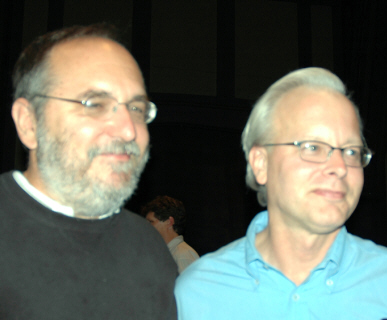Two tech pioneers: Dave and Ray

Dave Winer's OPML Roadshow in Berkeley was attended by more than the local geeks. Ray Ozzie, as well as Robert Scoble, represented Microsoft among the audience. Ray and Dave have had parallel careers, both spanning more than 25 years in the tech world. Ray is known primarily for creating Lotus Notes and Groove. He worked for Lotus for many years and then left after Lotus was acquired by IBM to found Groove Networks, which was acquired by Microsoft this spring. Now he is the process of figuring out the specifics of his new job as a chief technical officer at Microsoft.
Dave has spent most of his career outside the reach of big companies, a modern day software programmer outlaw. After creating a series of popular outlining products and selling his company to Symantec in 1987, Dave founded UserLand Software and eventually dove deep into the Internet, where he is credited with making primary contributions to the development of fundamental technologies such as SOAP and RSS.
Dave and Ray at the OPML Roadshow in Berkeley

Ray tends to think about big, innovative applications with long development cycles around collaboration, and Dave has spent his career working on simpler applications and underlying protocols, which have transformed the industry. Despite his outlaw persona, when Dave talks Microsoft listens. For the last few years, he has been evangelizing Microsoft on campus about RSS, blogging and other topics. I asked Ray what he thought about Dave's OPML Editor, but said he [Microsoft] would have to evaluate it more before rendering an opinion. He was impressed by the Roadshow. "I really enjoy people getting out and taking a risk. The road show is an innovative style of bringing something to market," Ray said.
My colleague and chief inquisitor Steve Gillmor asked Ray whether Lotus Notes was dead, or something like that. Ray responded to the contrary, noting that Notes has lots of developers who are very skilled with the tools and LotusScript, and will be busily employed for years to come. In other words, Notes--which is 20 years old if you count the five years Ray and team spent developing the product before it shipped--is a legacy application. And we are still trying to figure out what IBM Workplace is, which include Lotus Notes....